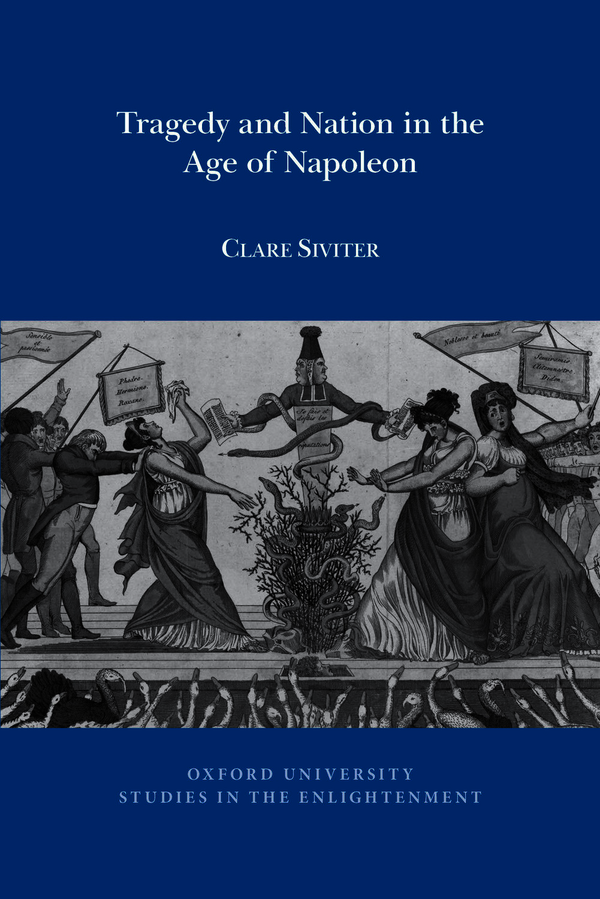
Tragedy and Nation in the Age of Napoleon
By Clare Siviter
Oxford University Studies in the Enlightenment 2020:05
ISBN: 9781789621051, 400 pages, £65.00
This first sustained study of tragedy under Napoleon examines how a variety of agents – including Napoleon, civil servants, the theatrical world, and the wider population – used tragedy and its rewriting of history to impact French politics, culture and society, and to help reconstruct the French nation after the Revolution.
- Uses rare sources from a collection of French and European archives, many of which have never been studied before.
- This monograph sheds new light on the transition from classicism to romanticism in French theatre.
- Revisits established claims about Napoleonic propaganda and censorship, showing there to be much more flexibility than currently believed.
"Before the advent of the internet, how did people come together through theatre? How did they consume it without necessarily being in the auditorium that night? How did it give them a sense of community? How did it spread ideas of a national culture?" (Read the accompanying blog post)
*
Table of Contents:
List of illustrations and tables
Acknowledgements
List of abbreviations
Note on the text
Introduction
Reconstructing the nation
Tracing tragedy
Research aims and structure
I. The reimposition of the tragic canon: introduction
Chapter 1: The tragic inheritance
The eighteenth century
The Revolution
Chapter 2: Rewriting the past
Attempts at adaptation
Institutional rewritings
Tracing tragedy in performance
The legacy of the afterlives
Chapter 3: Heroic conquerors
Censorship
Propaganda
II. New Napoleonic tragedies: introduction
Tragédie
Chapter 4: Composition, performance, reception: pulling back the curtain on censorship and propaganda
To the Comédie-Française
The bureaucratic censorship system
Back at the theatre
In print
Chapter 5: The ambiguity of antiquity
Ancient Greece: Pyrrhus, 1807, Polyxène, 1804, and Hector, 1809
Ancient Rome: Vitellie, 1809, Tibère, Bélisaire, Scipion, ou l’Africain and Camille, ou le Capitole sauvé
Chapter 6: Heroes of the East
Cyrus, 1804
Ninus II, 1813
Artaxerce, 1808
Omasis, ou Joseph en Egypte, 1806
Chapter 7: Fear of the foreign
Staging foreign history: Mahomet II, 1811, Pierre le Grand, 1804, and Don Pèdre, ou le Roi et le laboureur, 1802
Foreign threats: Jeanne Gray, Marie Stuart, L’Orphelin polonois, Gênes sauvée and Wallstein
Chapter 8: Meddling in the Middle Ages
The Middle Ages on the stage: Brunehaut, 1810, and Les Templiers, 1805
Unperformed medieval tragédies nationales: Charlemagne, Clovis, Baudouin empereur, La Dèmence de Charles VI, La Régence de Charles VII and Arthur de Bretagne
Chapter 9: Testing tragédies nationales
Les Etats de Blois, 1810 and 1814
La Mort de Henri IV, 1806
Tippo-Saëb, 1813
Conclusion
Appendix 1
Appendix 2
Appendix 3
Bibliography
Index
*
Clare Siviter is lecturer in French theatre and performance at the University of Bristol. Her research focuses on the longer Revolutionary period from 1789 to 1815 in France and Francophone communities, and she is particularly interested in censorship, propaganda, and theatrical encounters between different cultures.
*
The Oxford University Studies in the Enlightenment series, previously known as SVEC (Studies on Voltaire and the Eighteenth Century), has published over 500 peer-reviewed scholarly volumes since 1955 as part of the Voltaire Foundation at the University of Oxford. International in focus, Oxford University Studies in the Enlightenment volumes cover wide-ranging aspects of the eighteenth century and the Enlightenment, from gender studies to political theory, and from economics to visual arts and music, and are published in English or French.